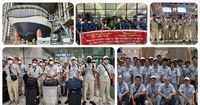On May 5, 2025, nearly 8,000 candidates from northern provinces gathered at the Sona Vocational Training and Labor Training Center in Me Linh district, Hanoi, to participate in the Korean language test, aiming for work opportunities in South Korea. This test is part of the Employment Permit System (EPS) program, which allows foreign workers to secure jobs in various sectors, particularly manufacturing and agriculture.
The Korean language proficiency test, known as EPS-TOPIK, is scheduled to run from May 5 to June 17, 2025, across three major regions: North, Central, and South Vietnam. In total, nearly 23,000 candidates nationwide registered for both manufacturing and agriculture sectors, while South Korea has a requirement for 3,300 workers in this phase.
Many workers arrived early on the day of the test, eager to check the lists and confirm their information. Agricultural workers were tested first, followed by those in manufacturing. According to the Department of Overseas Labor, this initiative is crucial for those seeking employment abroad, as it opens doors to better financial prospects.
As the clock struck 8:30 AM, candidates lined up to verify their information before entering the waiting room for fingerprint scanning. Each test site was staffed with 2 to 4 invigilators from the Department of Overseas Labor, in collaboration with the Korean Human Resources Development Agency (HRD Korea), to ensure proper identification and procedural guidance.
In a strict measure against cheating, any candidate found swapping places with another would have their results invalidated and face a four-year ban from the Korean language proficiency test. All candidates' information is carefully stored in a database for verification purposes. This year, two candidates were disqualified due to previous violations of exam regulations.
Starting from the 2024 exam, candidates are required to register for electronic identification level 2 through the VneID application, a move aimed at preventing document fraud and enhancing oversight. Additionally, candidates were marked with a number on their right hand that corresponded to their assigned computer, a tactic designed to prevent swapping during the test.
The Department of Overseas Labor has implemented modern technical measures in coordination with HRD Korea to detect any attempts to bring prohibited devices into the examination room or engage in impersonation. Before entering the computer room, candidates underwent checks using metal detectors and were also subject to manual inspections. To streamline this process, they were advised to avoid wearing clothing with metal accessories.
All aspects of the examination, including question creation, grading, and invigilation, are managed by HRD Korea, with online surveillance cameras monitoring the test in real-time. This year, the number of Korean invigilators in the exam room has been doubled to enhance oversight.
Successful candidates who pass both rounds of testing will be eligible to prepare application documents for introduction to potential employers in South Korea. However, not all candidates who pass will be selected by employers. The profiles sent to South Korea will have personal information concealed, and employers will choose candidates randomly, ensuring a fair selection process free from external influence.
The EPS program, a non-profit initiative established through an agreement between Vietnam's Ministry of Labor, Invalids and Social Affairs and South Korea's Ministry of Employment and Labor, has been operational since 2004. Since then, over 141,000 Vietnamese workers have been dispatched to South Korea under this program, with 2,753 workers already sent in the first four months of this year alone.
In 2025, the EPS program will focus on the manufacturing and agricultural sectors, with a total of 3,300 positions available—3,000 in manufacturing and 300 in agriculture. Workers must pass two rounds of testing: the Korean language proficiency test and a skills assessment. The exam locations include Hanoi, Da Nang, and Ho Chi Minh City, with specific dates set for each city.
To qualify, candidates must achieve a minimum score of 110 points for manufacturing and 80 points for agriculture. Additionally, those who pass the language test must also undergo a color vision test, a new requirement compared to previous years. Failure to meet these criteria will disqualify candidates from progressing to the skills assessment.
The Department of Overseas Labor has warned candidates to be vigilant against scams promising guaranteed passage or shortcuts to employment in South Korea. The only pathway to success remains diligent study and preparation for the Korean language and skills tests.
Upon successful completion of the exams, workers will be notified via SMS from the Department’s system when they are selected by employers in South Korea. The EPS program is designed to be transparent, with public access to procedures and costs involved, ensuring that workers are well-informed of their rights and obligations.
As the test continues across the country, candidates remain hopeful for the opportunity to improve their lives through employment in South Korea, driven by the promise of better wages and living conditions.




